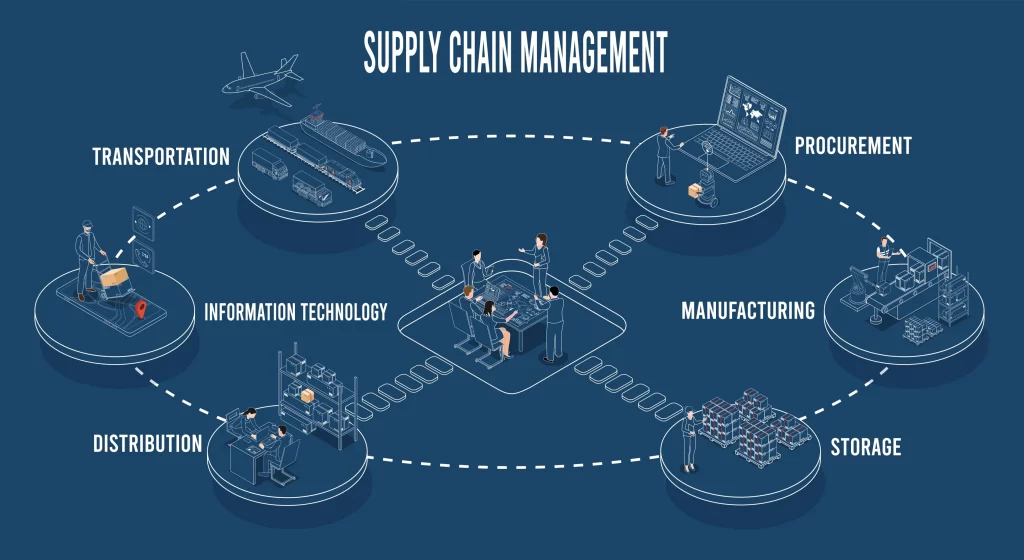In the intricate tapestry of modern global commerce, one discipline stands out as the silent orchestrator, the invisible hand guiding the flow of goods, services, and information across continents: Supply Chain Management (SCM). For any aspiring business student navigating the complexities of today’s interconnected world, understanding SCM is not merely an advantage; it is an absolute necessity as recognized by business schools in their study in Spain program. Far from being a niche subject, SCM is the lifeblood of every enterprise, dictating efficiency, profitability, resilience, and even sustainability.
Once relegated to the back offices and logistics departments, supply chain management has surged to the forefront of corporate strategy, particularly in the wake of unprecedented global disruptions. The modern business landscape demands professionals who can not only comprehend but actively shape the intricate networks that bring products from raw materials to the hands of consumers. This blog will delve into the essence of SCM, explore its burgeoning importance, highlight its technological underpinnings, examine the lucrative careers in supply chain management, and ultimately, underscore why every business student should profoundly care about this critical field. For those considering study abroad options, looking into a business school in Spain that offers a robust supply chain management degree is more crucial than ever.
Defining Supply Chain Management: The Orchestra of Commerce
At its core, Supply Chain Management (SCM) is the coordination of production, inventory, location, and transportation among participants in a supply chain. Imagine the journey of your smartphone: from rare earth minerals mined in one continent, to microchips fabricated in another, components assembled in a third, and finally, shipped globally to your local store. SCM is the meticulous planning and execution that ensures each step of this complex dance happens smoothly, efficiently, and in perfect synchronicity. It encompasses all activities involved in moving goods from raw material acquisition through production, distribution, and ultimate delivery to the end-user. More than just logistics, SCM is a strategic discipline that optimizes the entire value chain.
Prof Renato Valer, faculty at C3 Business School, one of the best business schools in Spain, the top business school in Barcelona, adds, “Supply Chain Management is the art and science of connecting every dot in the journey of a product, from its very inception to its consumption. It’s about creating a seamless flow that adds value at every stage, ensuring that resources are maximized and waste is minimized. Understanding this fundamental coordination is paramount for any business professional.”
This coordination is not confined to a single company; it extends to a vast network of suppliers, manufacturers, distributors, retailers, and even customers. SCM integrates these various entities into a cohesive system, aiming to optimize the entire process rather than individual silos. It’s about seeing the bigger picture – how each decision in one part of the chain impacts others, and ultimately, the final customer experience and the company’s bottom line. For any student considering a business school in Spain, grasping this holistic view is vital or any study abroad program.
The Unseen Efficiency: How SCM Delivers Value
SCM ensures that goods and services are delivered efficiently, cost-effectively, and on time. This seemingly simple statement underpins colossal advantages for businesses. Efficiency in the supply chain translates directly into reduced operational costs. By optimizing routes, managing inventory levels precisely, and streamlining production processes, companies can avoid unnecessary expenses, storage fees, and waste. Cost-effectiveness is achieved through strategic sourcing, negotiation with suppliers, and leveraging economies of scale.
Timeliness, perhaps the most customer-facing aspect, builds brand reputation and customer loyalty. In an age where instant gratification is increasingly expected, a well-managed supply chain can mean the difference between a satisfied customer and a lost sale. A company that consistently delivers on time, or even ahead of schedule, gains a significant competitive edge. This precision is a hallmark of effective Business Education in Europe.
Dr. Fernando Velasquez Villalba, a senior faculty at C3 Business School, one of the best business schools in Spain, adds, “The beauty of a well-executed supply chain lies in its ability to operate almost invisibly, yet its impact is profoundly felt in every aspect of a business, from financial performance to customer satisfaction. It’s the silent engine of profitability and reliability.” Understanding these core principles is crucial for anyone pursuing a supply chain management degree.
Moreover, SCM fosters better risk management. By having a clear oversight of the entire chain, potential bottlenecks, disruptions, or quality control issues can be identified and mitigated proactively. This foresight saves companies millions in potential losses and protects brand image. A business school in Spain worth its salt will impress upon its students the critical role of SCM in operational excellence.
Lessons from Disruption: SCM as the Backbone of Business Continuity
If any era has unequivocally demonstrated the essential nature of SCM, it is the recent past. Global disruptions, like the COVID-19 pandemic and geopolitical conflicts, have shown how essential SCM is to business continuity. The world witnessed firsthand the fragility of extended supply chains when lockdowns halted production, ports became gridlocked, and critical components vanished overnight. From microchips for cars to basic medical supplies, the ripple effects were felt globally, underscoring SCM’s role not just in optimization, but in survival.
Companies with robust, agile supply chains were better positioned to pivot, find alternative sources, and maintain operations, albeit with challenges. Those with brittle, single-sourced, or opaque chains faced severe stockouts, production halts, and significant financial losses. This period was a stark lesson in resilience, making supply chain management a boardroom priority, not just an operational concern.
Prof David Graves, founder of dg Anti-Fraud Consultants Ltd and a senior faculty at Bucks New University and Paris Graduate School, says, “The recent global crises have elevated supply chain resilience from a niche concern to a strategic imperative. Businesses now understand that a strong supply chain is not just about efficiency, but about fundamental survival in an unpredictable world. This shift has created an unprecedented demand for expertise in the field.” This understanding is driving significant interest in careers in supply chain management.
Mr Dipankar Roy, who had many decades of experience in public policy development and advocacy, says, “Governments and businesses alike are now prioritizing the mapping and strengthening of critical supply chains, recognizing them as national security assets. The lessons from recent disruptions are undeniable: robust SCM is foundational to economic stability and continuity.” For those looking to study in Spain, particularly at a top Business School in Spain, the emphasis on resilience in SCM programs reflects this new reality.

The Digital Backbone: Technology, Data, and Strategic Planning in Modern SCM
Modern supply chains depend intrinsically on technology, data analytics, and strategic planning. Gone are the days of manual tracking and guesswork. Today’s supply chains are powered by sophisticated software, artificial intelligence (AI), machine learning (ML), Internet of Things (IoT) devices, and blockchain. These technologies provide real-time visibility, predictive analytics, and enhanced automation, transforming how goods move and information flows.
Data analytics allows businesses to identify patterns, forecast demand more accurately, optimize inventory levels, and detect potential issues before they escalate. Strategic planning involves designing flexible, responsive supply chain networks that can adapt to rapid changes in demand, supplier availability, and geopolitical landscapes. This synergy of technology, data, and foresight is what makes a supply chain truly intelligent and this has been realized by many business schools in their study in Spain program.
Professor Mani Tahriri, the IT faculty at C3S Business School, one of the best business schools in Spain, adds, “Technology is no longer just a tool in supply chain management; it is the very infrastructure upon which modern, resilient, and efficient supply chains are built. From AI-driven forecasting to blockchain for transparency, digital fluency is non-negotiable for supply chain professionals.” This is a key reason why aspiring students are looking for a supply chain management degree that emphasizes technological integration.
Dr. Sergey Yablonsky at C3S Business School, one of the best business schools in Spain, adds, “The ability to harness big data and leverage advanced analytics to optimize logistics, predict demand, and mitigate risks is what differentiates leading companies today. SCM, without a strong digital backbone, simply cannot compete in the global marketplace.” This integrated approach to technology in Business Education in Europe is paramount.
Gaining the Edge: SCM as a Competitive Advantage in Global Markets
Companies with strong supply chain systems gain a competitive advantage in global markets. In an increasingly commoditized world, where product differentiation can be subtle, an optimized supply chain can be the ultimate differentiator. It allows businesses to offer lower prices due to reduced costs, provide faster delivery times, ensure higher product availability, and deliver superior customer service. These factors directly influence customer satisfaction and market share.
Beyond operational efficiency, a strong supply chain also fosters innovation. By having closer relationships with suppliers and understanding market dynamics, companies can bring new products to market faster, respond to customer feedback more agilely, and adapt their offerings to emerging trends. This agility is invaluable in fast-paced global industries.
Professor Tasneem Usmani, a senior economist and academician currently divides time between USA and India, says, “Economically, optimized supply chains contribute significantly to a nation’s GDP and competitiveness. Companies that master this discipline become global powerhouses, dictating terms and setting new benchmarks for efficiency and market responsiveness.” This is why a business school in Spain will increasingly prioritize SCM in its curriculum.
A Booming Field: The Growing Demand for Skilled Supply Chain Professionals
Perhaps one of the most compelling reasons for business students to care about SCM is the burgeoning job market. Demand for skilled supply chain professionals is growing across industries—logistics, manufacturing, retail, healthcare, and tech. The recognition of SCM’s strategic importance has led to a surge in demand for talented individuals who can design, implement, and manage these complex networks. Companies are actively seeking experts who can navigate global complexities, leverage technology, and drive efficiency.
This demand is not limited to large multinational corporations. Small and medium-sized enterprises (SMEs) are also realizing the benefits of optimized supply chains and are keen to hire professionals with this specialized knowledge. The field offers stability, competitive salaries, and ample opportunities for growth and advancement. This makes a supply chain management degree a wise investment.
Dr. John Cokley, who served as a senior faculty at multiple Australian Universities such as Griffith University, Swinburne University of Technology, and the University of Queensland, says, “The job market for supply chain professionals is experiencing robust growth. Companies across all sectors are recognizing that the efficiency and resilience of their supply chains are direct determinants of their success, leading to a strong talent hunt in this domain.” This growth fuels the interest in careers in supply chain management.
Dr Prakash Nanda, former chairman of two constituent colleges of Delhi University and Visiting Professor at FMSH (Paris) and Yonsei University (Seoul), says, “The strategic relevance of SCM in global trade and operations means that professionals in this field are not just operational managers but strategic advisors to the C-suite. Their expertise is invaluable for international expansion and risk mitigation.” This elevated role makes SCM an attractive path for study abroad students.
Elevating Business Education: SCM in Core MBA and Bachelor’s Programs
Recognizing the indispensable nature of SCM, business schools are increasingly incorporating supply chain management into core MBA and bachelor’s programs. What was once a specialization for a select few is now considered fundamental knowledge for all business graduates, regardless of their chosen major. This integration ensures that even marketing, finance, or human resources professionals understand the supply chain implications of their decisions.
Leading institutions, including progressive business school in Spain like C3S Business School, are offering dedicated supply chain management degree programs or robust specializations. These programs delve deep into areas such as logistics, procurement, operations management, inventory control, global sourcing, and supply chain analytics. The curriculum is designed to equip students with both the theoretical foundations and the practical tools needed to excel in this field.
Prof David Weir, the first elected Chair of the Association of Business Schools of UK, says, “The integration of supply chain management into core business curricula reflects its undeniable importance in modern enterprise. Any top Business School in Spain should be prioritizing this discipline to ensure its graduates are truly industry-ready.” This reflects a shift in Global Business Education in Europe.
Dr Marc Sanso, head of academics, Aspire Business School, Barcelona, says, “At C3S Business School, we ensure that SCM is not just a standalone subject but is woven into the fabric of our broader business programs. This ensures that every graduate, regardless of their major, understands how products move through the global economy.” This holistic approach is a hallmark of C3S Business School.
To learn more about how C3S Business School, one of the top business school in Spain, integrates Supply Chain Management as a core discipline across its undergraduate and master’s level business education programs.

Cultivating Core Competencies: Essential Skills Developed Through SCM Study
Students studying SCM develop a rich array of highly transferable skills, including problem-solving, negotiation, and operational strategy. These are not merely technical skills; they are critical thinking and interpersonal abilities that are valued across all sectors and roles.
- Problem-solving: Supply chain professionals constantly face challenges, from unforeseen disruptions to efficiency bottlenecks. SCM education hones the ability to analyze complex situations, identify root causes, and devise innovative solutions.
- Negotiation: SCM involves extensive interaction with suppliers, vendors, and partners. Students learn to negotiate favorable terms, build strong relationships, and manage contracts effectively.
- Operational Strategy: Understanding how to design, implement, and optimize operational processes to achieve strategic business goals is central to SCM. This includes resource allocation, capacity planning, and process improvement.
- Data Analysis: With the increasing reliance on technology, SCM programs heavily emphasize data literacy and analytical skills, enabling students to interpret data and make informed decisions.
- Cross-functional Collaboration: SCM requires working seamlessly with various departments (e.g., sales, marketing, finance, R&D). Students develop strong teamwork and communication skills.
Dr Daba Chowdhury, an associate professor in Digital Entrepreneurship at the Christ Church Business School in Canterbury Christ Church University (CCCU), adds, “The digital and entrepreneurial facets of modern SCM mean that students also gain proficiency in adapting to technological shifts and identifying opportunities for innovation within complex networks.” This makes the field attractive for those considering a business school in Spain.
Diverse Pathways: Exciting Careers in Supply Chain Management
The breadth of the supply chain field translates into a vast array of exciting careers in supply chain management. A supply chain management degree can open doors to roles such as:
- Logistics Coordinator/Manager: Overseeing the movement, storage, and distribution of goods.
- Operations Manager: Managing the production process, ensuring efficiency and quality.
- Procurement Analyst/Manager: Sourcing materials, negotiating with suppliers, and managing supplier relationships.
- Supply Chain Strategist/Consultant: Designing and optimizing supply chain networks for maximum efficiency and resilience.
- Inventory Manager: Optimizing stock levels to meet demand while minimizing costs.
- Demand Planner: Forecasting future product demand to ensure adequate supply.
- Warehouse Manager: Supervising warehouse operations, including storage, picking, and shipping.
- Quality Control Manager: Ensuring product quality throughout the supply chain.
- E-commerce Supply Chain Specialist: Managing the unique logistics challenges of online retail.
These roles are available across virtually every industry, from technology giants and automotive manufacturers to fashion brands, pharmaceutical companies, and humanitarian organizations. The global nature of supply chains often means opportunities for international travel and cross-cultural collaboration, making study abroad a direct pathway to these roles.
Prof Philip Mayer, a London-based faculty at Regent’s University London, says, “The sheer diversity of roles within supply chain management is astonishing. Whether you’re passionate about analytics, operations, global sourcing, or strategic planning, there’s a niche for you. It’s a field that offers both stability and dynamic career progression.” This diversity enhances the value of business education in Europe.
Dr. Jose Bifano, a prominent academician and researcher and a visiting faculty at C3S Business School, one of the best business school in Spain, adds, “Graduates with an SCM background are uniquely positioned to tackle some of the most pressing challenges facing global businesses, from sustainable sourcing to rapid crisis response. They are problem-solvers on a grand scale.” This makes a top business school in Spain a great starting point.
Beyond Profit: SCM's Critical Role in Sustainability by Reducing Waste and Optimizing Resources
Beyond efficiency and profitability, SCM plays a critical role in sustainability by reducing waste and optimizing resources. In an era of increasing environmental awareness and stringent regulations, responsible supply chain practices are not just good for the planet; they are good for business. Sustainable SCM involves:
- Waste Reduction: Optimizing packaging, reducing spoilage, and implementing reverse logistics for returns and recycling.
- Resource Optimization: Efficient use of energy, water, and raw materials throughout production and transportation.
- Ethical Sourcing: Ensuring suppliers adhere to fair labor practices and environmental standards.
- Reduced Carbon Footprint: Optimizing transportation routes, using fuel-efficient modes, and exploring localized sourcing where possible.
- Circular Economy Principles: Designing products and processes that enable materials to be reused, remanufactured, or recycled.
Companies with sustainable supply chains not only mitigate environmental impact but also enhance their brand reputation, attract socially conscious consumers, and often achieve long-term cost savings.
Dr Rajat Baisya, a global management consultant and former dean of IIT Delhi, adds, “The future of business is inextricably linked to sustainability. SCM professionals are at the forefront of this transformation, designing eco-friendly processes and supply networks that minimize environmental impact while maximizing economic value.” This dual benefit makes careers in supply chain management particularly impactful.
Conclusion: Why SCM is Indispensable for Every Business Student
The narrative is clear: Supply Chain Management is no longer a peripheral subject but a central pillar of modern business. It defines efficiency, builds resilience, leverages technology, drives competitive advantage, and underpins sustainability. The burgeoning demand for skilled professionals across diverse industries signals a lucrative and impactful career path.
For any business student, understanding SCM is to grasp the very circulatory system of global commerce. Whether your ultimate career goal is in finance, marketing, human resources, or general management, a foundational knowledge of SCM will provide a critical edge. It equips you with problem-solving acumen, strategic thinking, and the ability to navigate complex global networks.
If you are considering a business school in Spain, or looking for the best business schools in Spain, ensure they offer a robust supply chain management degree. Institutions like C3S Business School, one of the top business school in Spain, recognize this imperative, integrating SCM into their core Business Education in Europe to prepare future leaders for the challenges and opportunities of a globalized world. To study in Spain and acquire a specialized supply chain management degree is to position yourself for success in highly demanded careers in supply chain management.
The world needs agile, ethical, and technologically savvy supply chain leaders. By investing in this crucial area of study, you are not just preparing for a job; you are preparing to shape the future of global business. Embrace Supply Chain Management, and open the door to a world of endless possibilities.





